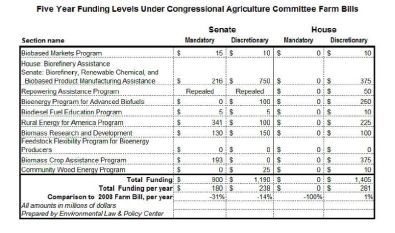The farm bill under negotiation is expected to have an energy title that has mandatory funding for farm energy programs, closely following a version adopted by the Senate Agriculture Committee last summer, sources say.
Both the Senate and House versions of the energy title would reauthorize the Rural Energy for America Program (REAP), the Biomass Crop Assistance Program (BCAP) and the Biorefinery Assistance Program. The House plan would provide nearly $1.4 billion, but all of the funding would be treated as discretionary spending subject to the will of the House and Senate Appropriations Committees. The Senate version would provide nearly $1.2 billion in discretionary funding, but would authorize another $900 million in mandatory funding.
The title adopted by the Senate panel was championed by Sens. Amy Klobuchar and Al Franken, both Democrats from Minnesota, which has a prominent biofuel industry. The say the measure highlights the important role the programs play in supporting jobs in rural communities and encouraging the development of energy efficiency and renewable energy production from wind, solar, biomass and biofuels in farms and rural businesses.

And while the House voted to make program funding discretionary, 30 members of the lower chamber went on record with a letter to Stabenow, Cochran and House committee Chairman Frank Lucas, R-Okla., and ranking member Collin Peterson, D-Minn., urging the passage of a fully funded energy title.
“American farmers have long led the world in food crop production, but as we seek to become more energy independent and less reliant on foreign sources of energy to power our economy, ag-based energy products are increasingly important,” the House members’ letter stated. In addition, more than 130 other national, regional and state farm, conservation and renewable energy stakeholder organizations have called on the conference committee leaders to adopt of a five-year farm bill that reauthorizes the proposed legislation’s energy title and provides the title with the $900 million in mandatory funding.
Farm energy program advocates say the energy title programs contained in the 2002 and 2008 farm bills have been vital components in the continued growth of the industries, contending that programs like REAP, the Biomass Crop Assistance Program and the Biorefinery Assistance Program offer public benefits that go beyond agriculture. They argue, however, that the programs are still relatively new and the next five years will be crucial for achieving success.
Created in 2003, REAP has offered grants and loan guarantees for more than 3,000 projects in rural communities with fewer than 50,000 people across the country, where they allow farmers, ranchers and rural small businesses who don’t otherwise have the capital to invest to develop clean energy resources on their lands and cut energy waste in their operations.
BCAP offers payments to owners and operators of agricultural and non-industrial private forest land to grow and deliver biomass feedstocks, like energy grasses, straw or crop residue. The Biorefinery Assistance Program provides loan guarantees for the development, construction and retrofitting of commercial-scale biorefineries to make advanced biofuels.
The Senate energy title earmarks about $48 million a year for REAP over the five-year bill’s duration. Some $58 million would be made available to the Biorefinery Assistance Program in fiscal 2014 and 2015, while BCAP would receive nearly $40 million in annual mandatory funding.
#30
For more news, go to www.agri-pulse.com.
